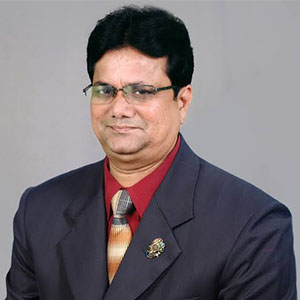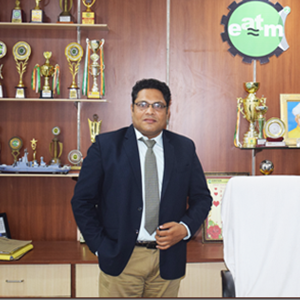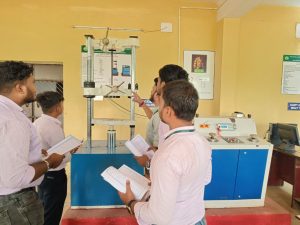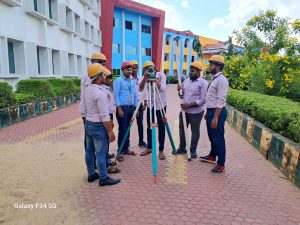Civil Engineering
- Introduction
- HOD's Message
- Faculty Members
- Vision & Mission
- Courses Offered
- COs
- POs
- PEOs & PSOs
- Laboratory Facilities
- Opportunities
- Achievements
-
Seminar, Workshop,
Conference, FDP, STTP - Value Added Courses
- Student Project/Internship
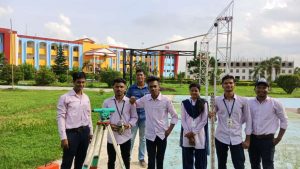 Civil Engineering is considered to be the most versatile branch among all the engineering branches. It is the branch with a lot of diversity from geotechnical engineering to structural engineering, environmental to hydraulics, transportation to hydrology; Civil Engineering can be considered as a single largest branch among all the engineering branches.
Civil Engineering is considered to be the most versatile branch among all the engineering branches. It is the branch with a lot of diversity from geotechnical engineering to structural engineering, environmental to hydraulics, transportation to hydrology; Civil Engineering can be considered as a single largest branch among all the engineering branches.
In the arena of worldwide infrastructural escalation, Department of Civil Engineering at EATM,Bhubaneswar has come up to dedicate excellence in engineering education, creation of knowledge, innovation in research and leadership in professional services.
The Department offers a four-year course leading to the Bachelors Degree in Civil Engineering , two-year courses leading to Master’s degree in specialisations of civil engineering (Structural Engineering )and three-year course leading to the Diploma Degree in Civil Engineering . In total there are 426 students pursuing Bachelors degree and 28 students pursuing Masters Degree and 120 students persuing Diploma degree in the department. There are currently 9 Assistant Professors and 1 Technical Officer working in the department.
It gives me profound pleasure and pride to explore a remarkable education world in the Department of Civil Engineering. Civil engineering is the second-oldest engineering discipline after military engineering. Civil Engineering is a professional engineering discipline that deals with the design, construction and maintenance of physically built works like roads, bridges, canals, dams and buildings. Civil engineers are important to the society as they are often referred as ‘Builders of Nation’.
It has been our endeavour, right from the beginning, to make our department a preferred destination for students who want to get to the top of this field. We aspire to mould our students into globally competent and well chiselled Civil Engineers who can meet the challenges of technological advancement. All efforts are also being made to inculcate social values and professional ethics in our students to face the current as well as future global standards. Well-qualified and competent faculties with well equipped labs are committed to provide an excellent teaching methodology for nurturing the students into excellent engineers as well as good human beings.
There are many career paths for civil engineers. Civil engineers are essential in government agencies, private and public sector undertakings to take up various mega projects like metro railway projects, express highway corridors, industrial structures, reservoir projects, flyovers, townships and mega city projects. Today, the world is undergoing vast changes in technological revolution, population growth and environmental concerns. All these changes create unique challenges for civil engineers. The next decade under the leadership of our prime minister, will be the most creative, demanding and rewarding times for civil engineers.
Post Graduate (M. Tech) | Structural Engineering (18 Intake) |
Under Graduate (B. Tech) | Civil Engineering (120 Intake) |
Diploma | Civil Engineering (60 Intake) |
Programme Outcomes (POs)
PO1: Engineering knowledge: Apply the knowledge of mathematics, science, engineering fundamentals, and an engineering specialization to the solution of complex engineering problems.
PO2: Problem analysis: Identify, formulate, review research literature, and analyze complex engineering problems reaching substantiated conclusions using first principles of mathematics, natural sciences, and engineering sciences
PO3: Design/development of solutions: Design solutions for complex engineering problems and design system components or processes that meet the specified needs with appropriate consideration for the public health and safety, and the cultural, societal, and environmental considerations.
PO4: Conduct investigations of complex problems: Use research-based knowledge and research methods including design of experiments, analysis and interpretation of data, and synthesis of the information to provide valid conclusions.
PO5: Modern tool usage: Create, select, and apply appropriate techniques, resources, and modern engineering and IT tools including prediction and modeling to complex engineering activities with an understanding of the limitations.
PO6: The engineer and society: Apply reasoning informed by the contextual knowledge to assess societal, health, safety, legal and cultural issues and the consequent responsibilities relevant to the professional engineering practice.
PO7: Environment and sustainability: Understand the impact of the professional engineering solutions in societal and environmental contexts, and demonstrate the knowledge of, and need for sustainable development.
PO8: Ethics: Apply ethical principles and commit to professional ethics and responsibilities and norms of the engineering practice.
PO9: Individual and team work: Function effectively as an individual, and as a member or leader in diverse teams, and in multidisciplinary settings.
PO10: Communication: Communicate effectively on complex engineering activities with the engineering community and with society at large, such as, being able to comprehend and write effective reports and design documentation, make effective presentations, and give and receive clear instructions.
PO11: Project management and finance: Demonstrate knowledge and understanding of the engineering and management principles and apply these to one’s own work, as a member and leader in a team, to manage projects and in multidisciplinary environments.
PO12: Life-long learning: Recognize the need for, and have the preparation and ability to engage in independent and life-long learning in the broadest context of technological change.
Program Educational Objectives (PEOs)
PEO 1: To prepare students to excel in undergraduate and graduate programs and to succeed as a successful Civil Engineer to take up professional challenges through rigorous training during the program.
PEO 2: To produce students who can apply their knowledge and skills to real life problems thereby not only rendering safe and economical structures against natural calamities but also environmentally sustainable and useful to the society.
PEO 3: Exhibit strong leadership quality, eagerness for lifelong continuous learning to adopt themselves in Civil Engineering domain.
PEO 4: To trained students in the professional and ethical attitudes, effective communication skills, teamwork skills, a multidisciplinary approach and an ability to relate engineering issues to a broader social context.
Program Specific Outcomes (PSOs)
PSO1: The graduates of this programme will be able to meet the needs of public in the design and execution of quality construction work considering the health, safety, cultural, societal and environmental factors.
PSO2: Apply modern construction techniques, equipment and management tools so as to complete the project within specified time and funds.
PSO3: Able to use knowledge in various domains in Civil Engineering to identify research gaps and hence to provide solutions, innovations and engage in lifelong learning for professional growth.



